
Garden Maintenance in Lucas Gardener
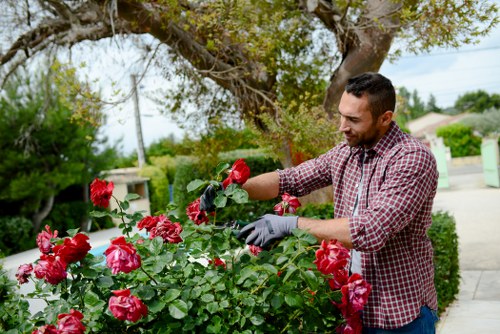
Maintaining a beautiful garden requires **consistent care** and attention to detail. In Lucas Gardener, garden maintenance isn't just a task; it's a passion that transforms outdoor spaces into vibrant, thriving environments.
From regular lawn care to seasonal planting, understanding the various aspects of garden maintenance ensures that your garden remains healthy and aesthetically pleasing throughout the year.
In this comprehensive guide, we'll explore essential garden maintenance practices tailored specifically for gardens in Lucas Gardener.
Regular Lawn Care
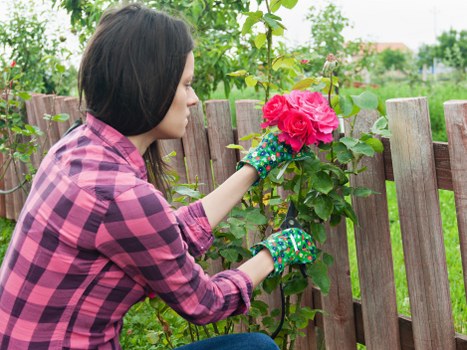
One of the foundational elements of garden maintenance is regular lawn care. A well-maintained lawn serves as the centerpiece of your garden, providing a lush green backdrop for other plants and features.
Proper mowing is crucial. It not only keeps your grass at an optimal height but also promotes healthier growth by encouraging the roots to develop deeper.
Additionally, consistent watering ensures that your lawn remains vibrant, especially during the hotter months when water can quickly evaporate.
Mowing Techniques
Adopting the right mowing techniques can make a significant difference in lawn health. It's recommended to mow your lawn when the grass is dry to achieve a clean cut and prevent clumping.
Varying the mowing pattern each time can prevent soil compaction and reduce the chances of weed growth by disrupting their seed distribution.
Always ensure that your mower blades are sharp to avoid tearing the grass, which can lead to increased susceptibility to diseases.
Best Time to Mow
The optimal time for mowing is mid-morning when the grass has fully dried from overnight dew but before the heat of the day sets in. This timing reduces stress on the grass and minimizes moisture loss.
Mower Maintenance
Regularly maintaining your lawn mower is essential for efficient operation. This includes cleaning the mower deck, checking and replacing blades as needed, and ensuring that all moving parts are well-lubricated.
Pruning and Trimming
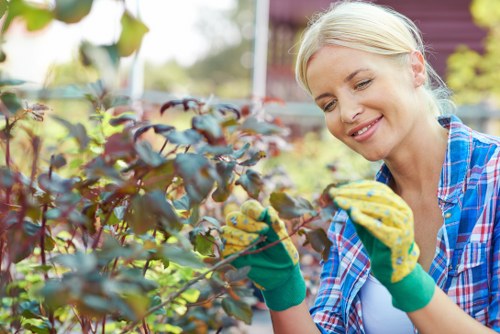
Pruning and trimming are vital for the overall health and appearance of your plants. By removing dead or diseased branches, you encourage new growth and prevent the spread of pests.
Different plants require specific pruning techniques. Understanding the unique needs of each species in your garden ensures effective maintenance and growth.
Investing in quality pruning tools can make the task easier and more precise, leading to better results.
When to Prune
Timing is crucial when it comes to pruning. Spring-flowering shrubs should be pruned immediately after they bloom, while summer-flowering varieties can be pruned in late winter.
Regular pruning during the growing season helps maintain the desired shape and size of your plants, promoting healthier growth.
Avoid pruning during extreme weather conditions, such as the peak of summer or deep winter, to prevent stress on the plants.
Tools You Need
Essential pruning tools include sharp shears, loppers, and pruning saws. Keeping these tools clean and sharp ensures precise cuts, reducing the risk of damaging your plants.
Techniques for Different Plants
Learn the specific pruning techniques for various plant types. For example, roses benefit from a distinct pruning method compared to fruit-bearing trees or ornamental shrubs.
Weed Control
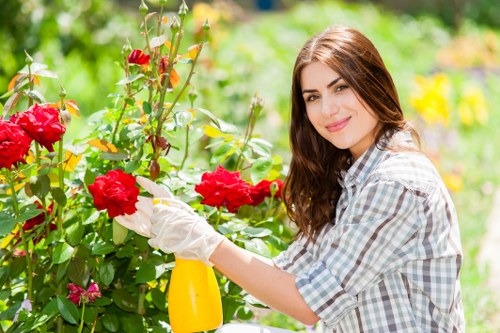
Weeds can quickly take over a garden, competing with your plants for nutrients and water. Effective weed control is a fundamental aspect of garden maintenance in Lucas Gardener.
Implementing both preventative measures and direct removal techniques ensures that your garden remains weed-free and healthy.
Choosing the right weed control method depends on the specific weed types and the overall garden ecosystem.
Identifying Common Weeds
Familiarize yourself with the common weeds prevalent in Lucas Gardener. Identifying them correctly aids in selecting the most effective control methods.
Some weeds may require manual removal, while others might need targeted chemical treatments for complete eradication.
Regular garden inspections help catch weed infestations early, making control easier and less time-consuming.
Natural vs. Chemical Control
Natural weed control methods, such as mulching and manual weeding, are environmentally friendly and safe for beneficial insects.
Chemical controls, like herbicides, can be effective but should be used sparingly to avoid harming other plants and wildlife.
Integrating both methods can provide a balanced approach to maintaining a weed-free garden.
Preventative Measures
Preventative measures, such as installing landscape fabric, applying mulch, and maintaining healthy soil, reduce the likelihood of weed growth.
Encouraging strong, healthy plants can naturally suppress weed emergence by limiting available space and resources.
Soil Health and Fertilization
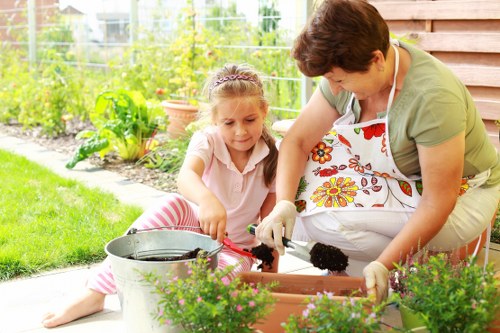
Healthy soil is the foundation of a thriving garden. Proper soil maintenance and fertilization ensure that your plants receive the necessary nutrients for optimal growth.
Regularly testing your soil's pH and nutrient levels helps determine the specific needs of your garden, allowing for targeted fertilization.
Incorporating organic matter, such as compost, enhances soil structure and fertility, promoting robust plant development.
Testing Soil pH
Soil pH affects nutrient availability and overall plant health. Most garden plants thrive in slightly acidic to neutral soil, with a pH range of 6.0 to 7.0.
Using a soil testing kit, you can easily check the pH levels and make necessary adjustments through the addition of lime or sulfur.
Regular soil testing ensures that your garden maintains the optimal conditions for plant growth.
Choosing the Right Fertilizer
Selecting the appropriate fertilizer depends on your soil's nutrient profile and the specific needs of your plants. Organic fertilizers, such as compost and manure, provide a slow-release nutrient source.
Chemical fertilizers offer immediate nutrient availability but should be used judiciously to prevent soil imbalance.
Balancing nitrogen, phosphorus, and potassium is essential for overall plant health and growth.
Composting Tips
Composting is an excellent way to recycle garden waste and enrich your soil. Creating a balanced compost pile with greens and browns accelerates decomposition and nutrient release.
Regular turning of the compost pile ensures proper aeration, speeding up the composting process and preventing unpleasant odors.
Applying mature compost to your garden beds enhances soil structure, moisture retention, and fertility.
Seasonal Maintenance Tips
Adapting your garden maintenance practices to the changing seasons ensures year-round garden health and beauty. Each season brings unique challenges and opportunities for garden care.
In spring, focus on planting new specimens and preparing beds for the growing season. Summer requires diligent watering and pest control, while fall involves leaf cleanup and soil enrichment.
Winter maintenance includes protecting plants from frost and planning for the upcoming growing season.
Irrigation and Water Management
Efficient irrigation is crucial for maintaining a healthy garden, especially in areas like Lucas Gardener where weather patterns can vary.
Implementing water-saving techniques and systems not only conserves water but also promotes sustainable gardening practices.
Proper water management prevents overwatering and under-watering, ensuring that your plants receive the optimal amount of moisture.
Efficient Watering Practices
Water your garden early in the morning or late in the evening to reduce evaporation and allow plants to absorb moisture effectively.
Using drip irrigation systems delivers water directly to the plant roots, minimizing waste and promoting deep root growth.
Regularly checking and adjusting your watering schedule based on weather conditions ensures that your plants receive consistent care.
Installing Irrigation Systems
Installing automated irrigation systems can save time and ensure precise water delivery to your garden. These systems can be programmed to water at specific times and durations, optimizing water usage.
Consider incorporating timers and moisture sensors to enhance the efficiency of your irrigation setup.
Professional installation can ensure that your irrigation system is tailored to the unique layout and needs of your garden.
Rainwater Harvesting
Rainwater harvesting is an eco-friendly method of collecting and storing rainwater for garden use. Utilizing rain barrels or cisterns reduces reliance on municipal water sources.
Implementing rain gardens helps manage runoff and enhances water absorption, benefiting both your garden and the local ecosystem.
Regular maintenance of rainwater harvesting systems ensures clean and efficient water collection.
Pest and Disease Management

Managing pests and diseases is a critical aspect of garden maintenance. Proactive measures and timely interventions prevent infestations and ensure plant health.
Understanding the common pests and diseases in Lucas Gardener allows for targeted control methods, minimizing damage to your garden.
Integrating natural predators and organic treatments can effectively manage pest populations without harming beneficial insects.
Common Garden Pests
Identify and monitor common garden pests such as aphids, caterpillars, and beetles. Early detection facilitates prompt and effective control measures.
Regularly inspecting plants helps catch pest issues before they escalate, reducing the need for extensive treatments.
Maintaining plant diversity can naturally deter pest populations by disrupting their access to preferred hosts.
Organic Pest Control Methods
Organic pest control methods, such as introducing ladybugs or using neem oil, provide effective management without the use of harsh chemicals.
Hand-picking pests off plants is a simple yet effective strategy, especially for minor infestations.
Companion planting can naturally repel pests by using plants that deter unwanted insects.
Monitoring and Prevention
Consistent monitoring and maintenance routines help prevent pest and disease outbreaks. Healthy plants are more resilient and less susceptible to infestations.
Implementing preventive measures, such as crop rotation and maintaining proper plant spacing, reduces the likelihood of pest and disease issues.
Educate yourself about the signs of common diseases to address them promptly and maintain a thriving garden.
Enhancing Garden Aesthetics
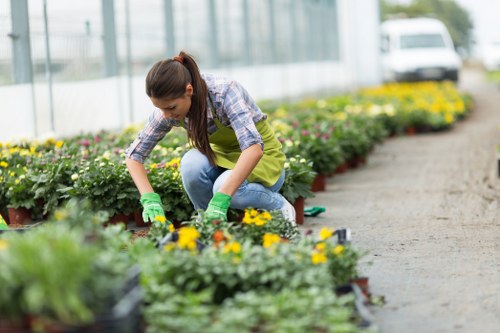
Beyond functionality, garden maintenance enhances the visual appeal of your outdoor space. Aesthetic considerations contribute to a welcoming and enjoyable environment.
Thoughtful plant selection and arrangement create a harmonious balance, while garden decorations add character and charm.
Maintaining pathways and structures ensures safety and accessibility, completing the overall garden design.
Plant Selection and Arrangement
Select plants that complement each other in terms of color, size, and blooming periods. This creates a cohesive and visually appealing garden landscape.
Arrange taller plants at the back and shorter ones in front to create depth and structure within the garden.
Incorporate a mix of perennials and annuals to ensure continuous blooms throughout the seasons.
Garden Decorations
Incorporate elements such as garden statues, fountains, or decorative lighting to add personality and interest to your garden.
Choosing decorations that align with your garden's theme enhances its overall aesthetic and creates focal points.
Regularly maintaining decorative elements prevents deterioration and maintains their visual impact.
Maintaining Pathways and Structures
Keep garden pathways clear of debris and ensure they are well-defined to facilitate easy navigation through your garden.
Maintain garden structures like pergolas and trellises by cleaning and repairing them as needed, preserving their functionality and appearance.
Regular inspections help identify and address any issues with garden infrastructure, ensuring longevity and safety.
Hiring Professional Garden Maintenance Services
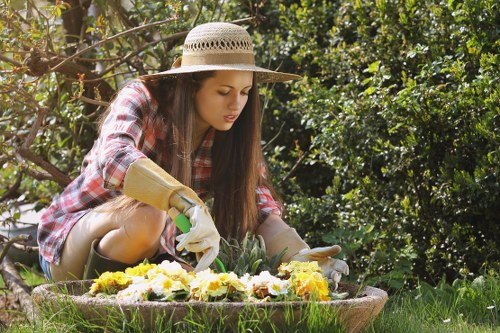
While DIY garden maintenance is rewarding, hiring professional services can provide expertise and save you time. Professional gardeners understand the unique needs of your garden and can implement effective maintenance strategies.
Professional services offer comprehensive care, from lawn mowing and pruning to pest control and seasonal planting, ensuring your garden remains in optimal condition.
Investing in professional garden maintenance enhances the overall health and beauty of your outdoor space, allowing you to enjoy a stunning garden without the hassle.
Benefits of Professional Help
Professional gardeners bring expertise and experience, ensuring that your garden receives the best possible care. They stay updated on the latest gardening techniques and trends, applying them to your garden maintenance plan.
Hiring professionals can save you time and effort, allowing you to focus on other aspects of your life while still enjoying a beautiful garden.
Professionals can identify and address issues that may not be apparent to the untrained eye, preventing potential problems before they escalate.
Choosing the Right Service Provider
When selecting a garden maintenance service, consider their experience, reputation, and range of services offered. Reading reviews and seeking recommendations can help you make an informed decision.
Ensure that the service provider understands your specific garden needs and can tailor their services accordingly.
Discussing your expectations and maintenance goals with the provider ensures a clear understanding and successful partnership.
What to Expect
Professional garden maintenance services typically include a detailed assessment of your garden, a customized maintenance plan, and regular upkeep activities. Communication is key to ensuring that the services align with your expectations.
Regular updates and reports from the service provider keep you informed about the status of your garden and any areas that may need attention.
Flexibility in scheduling and services allows for adjustments based on seasonal changes and garden growth.
Maintaining a beautiful garden in Lucas Gardener involves a combination of regular care, strategic planning, and sometimes professional assistance. By implementing these garden maintenance practices, you can ensure that your outdoor space remains a lush, vibrant sanctuary all year round.
Contact us today to learn more about our garden maintenance services and book your service now to transform your garden into a stunning haven.








